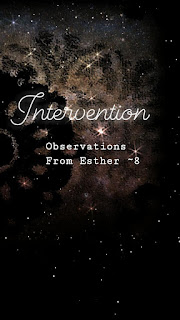Yesterday we left with Haman out of the picture but a problem still on the horizon. We pick up in Esther Chapter 8.
Talk about a turn of events. Mordecai now owns Haman's estate and is wearing Xeres' signet ring after it was retrieved from Haman. However, because the edict cannot be revoked, nothing has really changed. The Jewish people are still in danger unless something happens.
After reading we know that the Jews are given the right to assemble and defend themselves, to destroy, kill, and annihilate every ethnic and provincial army hostile to them. And this is a good thing. They are now able to stand up for themselves to protect their very lives. As a result, the people shouted, rejoiced, and celebrated.
As I read this, I kept thinking about Jesus' words that the thief comes to steal, kill, and destroy. And we know, like the Jews in Esther, we have a right to defend ourselves. The question is, do we?
Do we stand up to the lies we hear about who we are?
Do we silence the enemy when he whispers and plants seeds of doubt?
Do we even recognize it is happening?
I know I don't. But that's because a lot of the time the voice is probably more of my own than someone else's. Because I've heard the lies enough they've become my own negative reinforcement statements. The enemy doesn't have to continue the job when I've taken over for him.
Which leads me to the hard question.
Esther threw herself at the feet of Xeres weeping because the problem still existed and he extended the scepter to her so that she could approach him again with her problem. And because of Jesus' finished work on the cross, we can approach God's throne of grace with confidence so that we may receive mercy and find grace to help us in our time of need. (Hebrews 4:16) The question again is, do we?
Do we go to get help?
Can we even admit we need it?
Here's the thing. We like to think we are way more competent and able than we are. We like to think we've done something previously and therefore our experience qualifies us to handle it on our own. But on our own is the idol of self. And on our own was never the original plan. God created us to be in communion with Him and Jesus reinforced this when He said apart from me you can do nothing. (John 15:5)
So, if doing it alone says we don't need God, and Jesus told us we need Him to do anything at all, what stops us from going?
I can't speak for you, but I can tell you my hangups.
1. I don't think I deserve help. (In reality, this is right, I don't deserve it. But that's what's so amazing about grace.)
2. I believe I got myself into the mess so I have to get myself out. (While I am a product of my decisions and consequences naturally follow, God's love for me supersedes my own foolishness.)
3. I think I've done it before, I can handle it this time on my own. (For a God who is super creative, I am willing to bet there is something unique about each situation that allows Him to display His ability and therefore what was done before isn't the solution now.)
Other than to say we are human, which sounds more and more like a copout, this will likely be our default mode. It's going to take time and intentionality to break free from this kind of faulty thought pattern. But the best part is that part of God's specialty is intervention. While we were still sinners, He intervened with Jesus. And because of that, we can be like Esther and throw ourselves at His feet and ask for help.
Reflection Questions
1. What is happening right now that we have been trying to handle on our own? How's that working out?
2. What is the worst thing that could possibly happen if we went to God with it? Does our answer to that question line up with what we know is correct about His character?
3. If we were to throw ourselves at His feet and stop trying to handle it ourselves, what benefits would result?
4. Are we willing to try things His way and accept that we can't do it alone?

No comments:
Post a Comment